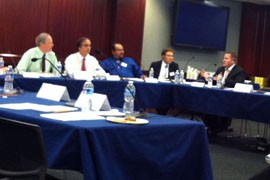Cronkite News has moved to a new home at cronkitenews.azpbs.org. Use this site to search archives from 2011 to May 2015. You can search the new site for current stories.
State may sue EPA to get action on air-quality plans, environment official says
WASHINGTON – Arizona is tired of waiting for the federal government to act on the state’s proposed air-quality plan and “very well may” sue the Environmental Protection Agency if action is not taken soon, a state official said Thursday.
“I’m getting ready to sue the EPA over SIPs (state implementation plans) because that seems to be the only way to get their attention,” said Henry Darwin, the director of Arizona’s Department of Environmental Quality.
He was one of several state environmental agency directors on Capitol Hill for a congressional roundtable Thursday on the Clean Air Act. In written remarks, Darwin said states have become “marginalized” by the EPA’s current process for considering state implementation plans.
“EPA often decides when to review SIPs based upon the risk of being sued by special interest groups,” he said. “This has led to the state process being marginalized, and resulted in significant delays in implementing environmental protections.”
EPA officials could not immediately return requests for comment on Thursday.
While state officials at the meeting said they were frustrated with the EPA, they also said they typically enjoy good relationships with the federal agency.
“There are times when we’ve had a lot of success from collaboration,” said Steve Herrera, executive officer of the Southern Ute Indian tribe.
And speakers praised the vision the Clean Air Act set forth for local, state and federal agencies.
“The way the act is built, it has to be a team effort,” said Rep. Brian Bilbray, R-Calif.
But current methods of implementing the act need to be tweaked, officials said.
Susana Hildebrand, chief engineer at the Texas Commission on Environmental Quality, agreed that the EPA decision-making process can be lawsuit-driven, which she said is a “little warped.” She called for new incentives, saying the EPA should have an 18-month period to act on a plan or it would automatically be approved.
While states face repercussions for missing deadlines, Hildebrand said, the EPA does not.
“Nothing bad happens to the EPA if they don’t” follow their own timelines, she said.
But forcing the EPA to act too quickly could turn out poorly for all involved, said Barry Wallerstein, an executive officer at the South Coast Air Quality Management District in California.
“I’d be very careful balancing here,” Wallerstein said. “You may promote the EPA to act in a less-than-thorough manner.”
Collin O’Mara, secretary of the Delaware Department of Natural Resources and Environmental Controls, said that opening a dialog with the federal government is key to avoiding these issues.
“So many times the regulators don’t talk to the industry, and it ends up in litigation,” he said. “It just comes down to the dialog.”
But Darwin said he worries the only way to open the dialog with the EPA is through a lawsuit.
“It’s the last thing I want to do,” he said. “I still consider the EPA a partner, but if they’re going to refuse to talk to us on an issue this important to Arizona, we have no choice.”
The important issue is the state’s plan to combat regional haze. Darwin said that when his agency tried to intervene on the side of the EPA in a lawsuit filed over the plan, the federal agency said it could not discuss the suit with ADEQ.
Darwin said his frustration is with EPA headquarters only, and that his agency’s relationship with EPA’s regional office is “great.”
Officials Thursday said they welcomed the chance to share air-quality successes they have had under the act, and discuss where the law was outdated. They also called for more collaboration with the federal agencies and for reforming the standard-setting process.
“Achieving a high level of public health is possible,” O’Mara said. “We can have breathable air and there’s a cheaper way to do it, if we’re smart about it.”







